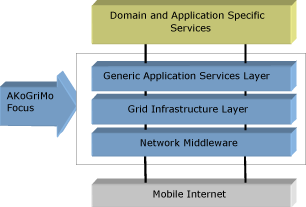Akogrimo - The Grid goes Mobile
by Stefan Wesner, Theo Dimitrakos and Keith Jeffrey
Mobility has become a central aspect of life for European citizens - in business, education, and leisure. Due to rapid technological and societal changes, there has been an astonishing growth of technologies and services for mobile users. Large investments have been made in order to provide the necessary infrastructures across Europe. In 2003 the number of Internet connected handsets or mobile hosts equalled the number of fixed Internet connected. Taking into account this evolution, Akogrimo — by leveraging the large base of mobile users — is aiming to radically advance the pervasiveness of Grid computing across Europe.
Akogrimo will bring together the market orientation and pervasiveness of mobile communication technology in everyday life with the promise of a dynamically concerted use of resources and services provided through Grid infrastructures.
By integrating the widely disjoint worlds of data communication, telecommunication and distributed service architectures, the final result of the Akogrimo exercise will be a commercial operator-oriented architecture and platform, which supports the deployment of Grid services in a worldwide perspective.
 |
| The 'Next Generation GRIDNET'. |
Selected scenarios showing the potentials of the innovative Akogrimo approach for the quality of life of the public citizen, for business opportunities for both small and medium enterprises as well as large companies including network providers will validate the Akogrimo architecture.
The vision of Akogrimo is accordingly a world in which:
- Grid services, pervasively available, are eventually meeting the ‘everywhere at any time in any context’ paradigm
- Grid services, comprising personalized knowledge and semantics, are allowing for ad-hoc, dynamic, and possibly federated formation of complex problem solving scenarios in everyday life, in business and science - to fixed, nomadic and mobile citizens
- network and service operators are able to develop new business activities and to provide profitable services in such an integrated world based on Grid and Mobile communications concepts.
Scenarios
The realization of a challenging framework merging Grid service architectures with the underlying mobile network technology requires an iterative realization approach. Iterations of the framework need one or more non-trivial scenarios that are able to validate the features and capabilities that are added to the framework. The approach within Akogrimo foresees to define, in the scenario specification phase, performance requirements and to validate early versions through prototypes or ‘validation scenarios’ testing a limited set of the functionality. Following the framework’s evolution, the validation progresses from system component level to the complete demonstrator.
The three scenarios foreseen so far for validation impose demands that firstly reflect requirements from ‘traditional’ Grid applications, namely access to distributed data and compute intensive services. In addition the scenarios demonstrate the need for mobile dynamic virtual organizations (MDVO) exhibiting the ability to dynamically adapt the organizational structure to changing local situations (through context awareness, availability of shared mobile resources). Within these MDVOs, complex workflows based upon Grid infrastructure and Grid services to access data from distributed, sometimes even mobile databases will be to dynamically established and processed. Of particular relevance is the integration of location based services and spontaneous usability.
The IP(v6) capable network supporting the scenarios and their related requirements will be constructed and derived from the infrastructure built in Stuttgart and Madrid in the context of the IST Moby Dick and Daidalos projects. This infrastructure integrates IP-based Mobility, AAA, QoS and network security on a pure Mobile IPv6 platform.
At the moment the following scenarios have been identified:
Akogrimo eLearning
The Akogrimo eLearning scenario will be embedded in the frame of the E-Learning domain. The focus in this scenario will be to build a showcase for new ways of learning that is made possible by the Akogrimo infrastructure. It is planned to liaise with the Integrated Projects ELeGI and to utilise the Mobile University testbed of the Daidalos project in order to increase the impact.
Akogrimo eHealth
The Akogrimo eHealth testbed explores Grid technology and the Mobility paradigm in the healthcare domain. It builds on previous successful results from a 6-year German priority research program. Target users of a Grid based healthcare information system are the European citizens, mobile pervasive demand for healthcare services (eg chronic diseases), and from the healthcare service suppliers all types of healthcare service providing institutions and stationary or mobile professionals which include healthcare advisors, pharmacies, nursing services, hospitals, emergency service devices and emergency stations.
Akogrimo Disaster Handling and Crisis Management (DHCM)
Akogrimo DHCM involves incidents where various crises or disasters should be handled by rescue services and other mission-critical mobile personnel, who have to collaborate within time-critical and dangerous situations such as large sport events, concerts or special locations such as airports or railway stations.
Conclusion
Akogrimo adds a new dimension to the Grid. Mobility and network integration has not been addressed so far by other initiatives. With a merged infrastructure enabling cross-layer communication between network and Grid middleware new kind of applications are possible that attract not only researchers in specific domains but enable the provision of services for the public citizen making a pervasive Grid possible.
Links:
Akogrimo: http://www.mobilegrids.org
Moby Dick: http://www.ist-mobydick.org/
Daidalos: http://www.ist-daidalos.org
ELeGI: http://www.elegi.org
Please contact:
Antonio Sánchez Esguevillas, Telefónica,
Project Coordinator
Tel: +34 983 367 577
E-mail ajse tid.es tid.es
Stefan Wesner, High Performance
Computing Center, HLRS, Stuttgart,
Germany, Project Manager
Tel: +49711 685 4275
E-mail: wesner hlrs.de hlrs.de
|



